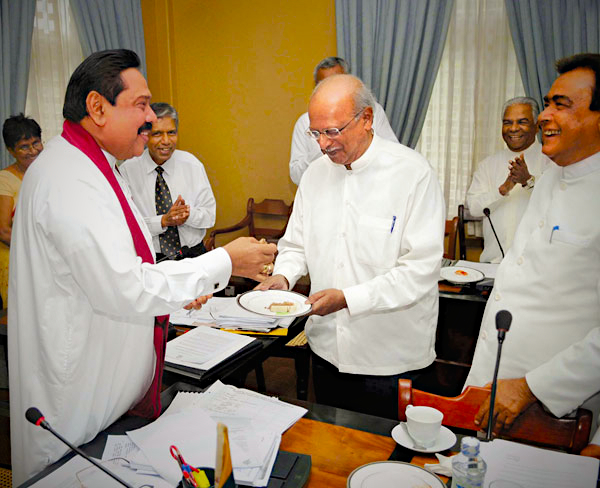
*groundviewsjournalism Forcitizens
8 Sep, 2011
Tissa Vitharana eats the President’s cake, courtesy Dinamina.
Extremist Sinhala nationalists within the parliament and outside who do not believe that the minority communities have or ever had any grievances see no reason why there should be a political settlement. As Basil Rajapaksa has pointed out if the TNA (Tamil national alliance) thinks it has a mandates for devolution of power, then the president has a bigger mandate from the South not to devolve power. The Defence Secretary, Gothabya Rajapaksa, the most important policy maker in the country today has flatly denied the need for a political settlemet. According to him since the LTTE has been exterminated there is no need for devolution; the present constitution is more than enough for all communities to live in peace. President Mahinda Rajapaksa himself doesn’t appear to be very keen on a political settlement. He played around with the APRC for almost four years and then discarded the report if produced after numerous sittings. Now it seems it’s time to hide behind a Parliamentary select committee. As a senior university lecturer Sumanasiri Liyanage points out, “what is clear is that the government is not honest and genuine in dealing with the TNA and is trying to drag the discussions without making a genuine effort to reach a consensus. What has been revealed so far shows clearly that the government is not serious about resolving the Tamil National question”. Referring to the government’s lack of commitment, Dr. Pakiasothy Saravanamuttu says the APRC and PSC are only ruses to pass the buck, buy time and appease the international community.Continue reading »
==============================================
 08-Sep-2011
08-Sep-2011 Indian Assistance to Sri Lanka for Rehabilitation and Reconstruction – Few Reflections
Guest Column by V. Suryanarayan and Ashik BonoferStudents of contemporary South Asian history are aware of the fact that the Government of India has responded favourably and spontaneously to any appeal for assistance by the Sri Lankan Government to tackle its domestic problems. Two illustrations are in order.
